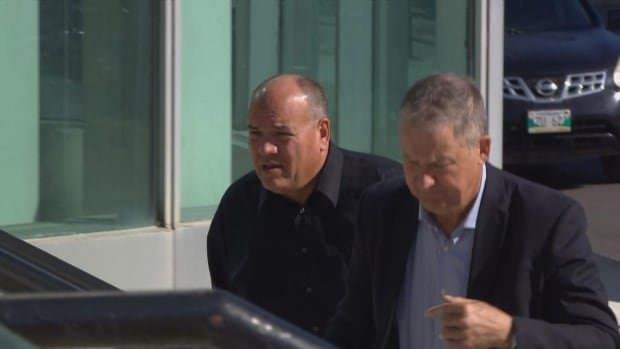‘Shame on you,’ judge tells former Winnipeg high school football coach sentenced to 20 years for sexual abuse

WARNING | This story contains details of abuse.
A disgraced former high school football coach was taken into custody Monday afternoon in front of a Winnipeg courtroom packed with supporters of his victims, after being sentenced to 20 years in prison for sexually abusing nine players over more than a decade.
People wiped tears from their eyes and embraced after Kelsey McKay’s sentence was handed down by provincial court Judge Raymond Wyant, whose voice was heavy with emotion as he delivered his decision.
“From the bottom of my heart, what happened to you was not your fault,” Wyant said as he addressed McKay’s victims and their supporters, including the family of a man who court heard died by suicide months after coming forward to police in 2022.
“The guilt lies squarely on the shoulders of Mr. McKay. You were children. You were guiltless. You put your faith in the hands of someone you saw as a friend, as a mentor, as a teacher, as a coach, as someone larger than life to you.”
The decision comes more than six months after lawyers made sentencing arguments in McKay’s case — a delay the judge attributed to how much the details of the case weighed on him.
Addressing McKay directly, Wyant said he wanted to take the time to ensure the sentence, which was his last before retirement, wasn’t clouded by the “abject anger that your violation of these kids had on me.”
“You used vulnerability to your advantage in your twisted game. Shame on you, Mr. McKay — shame on you,” Wyant told him. “Mr. McKay abused children for his own gratification. There is no excuse for what he has done and there is no cure for the havoc he wreaked.”
WATCH | Former Winnipeg high school football coach sentenced for sexually abusing players:
Kelsey McKay, a former Winnipeg high school football coach who pleaded guilty to sexually abusing nine players has been sentenced to 20 years in prison.
McKay, now 54, demonstrated a pattern of grooming his victims and often preyed on their vulnerabilities over a period of 13 years, Wyant said. Some of the offending behaviour happened when the victims were as young as 12 years old, the judge said.
Some of them had troubled home lives and viewed McKay as a role model or father figure, court heard.
Court also heard McKay invited players to his home, where he at times showed them pornography, gave them alcohol, massaged them and touched their genitals. McKay also texted the players and would sometimes drive them to school.
Wyant noted McKay’s behaviour caused rifts in some of the victims’ families, and that his contact with some of the victims only ended when he was arrested in 2022.
‘Tsunami effect’
Some of McKay’s victims and their family members told court in vivid detail earlier this year about the effects the abuse had on them and their families, including suicidal thoughts, addictions, post-traumatic stress, depression and “personal challenges almost too numbing to contemplate,” Wyant said.
The judge, who said he’s also spent time coaching youth sports, said McKay’s actions had a “tsunami effect” across the community’s perception of people in positions of authority over their children.
“What you did undermined every teacher, every volunteer, every coach — you tainted and tarnished each and every one of them. Your type of behaviour erodes and destroys the trust that people put in teachers and coaches,” Wyant said.
McKay was a prominent figure in Winnipeg’s football community and was still actively coaching and teaching when he was arrested in 2022. He was promoted to head coach at Churchill High School in 2003 before going to Vincent Massey Collegiate in 2009.
McKay pleaded guilty last year to nine counts of sexual assault and two counts of luring. CBC News is not naming the players involved in the case because of a publication ban.
Court heard there was a suggestion in McKay’s pre-sentence reports that he “might have himself been a victim of sexual assault at a younger age” — a detail the judge called “sad, but not surprising.”
“It may serve to be a partial explanation, but it is never itself an excuse,” Wyant said. “It demonstrates graphically the pernicious effects of victimization on children, and why courts must do what they can to denounce such conduct in order to assist in breaking the cycle of violence.”
Sentencing recommendations
Crown attorney Katie Dojack asked during sentencing arguments earlier this year for McKay to be sentenced to 25 years in prison, saying each of his victims had been “sentenced to a lifetime of harm and suffering.”
Dojack said McKay created a “psychologically dangerous” environment for the high school players and had opportunities to stop his abuse at any time.
McKay’s lawyers, Josh Weinstein and Lisa LaBossiere, said a sentence of just over 13 years would be more “meaningful” for McKay, given his age and the fact that he pleaded guilty.
McKay also read an apology at that sentencing hearing to the victims and their families, taking responsibility for what he did and saying he was sorry for the “hurt, grief, shame and sorrow” he caused them.
“I know this hurt and betrayal will affect them all for the rest of their lives,” he said, not turning around to face the audience as he spoke.
Weinstein told the court in March McKay “is not a lost cause,” since the former coach has several times expressed remorse about the abuse.
“This is a journey and it is not an easy, straight line,” said Weinstein. “He recognizes where he is and where he needs to get to.”
Support is available for anyone who has been sexually assaulted. You can access crisis lines and local support services through this government of Canada website or the Ending Violence Association of Canada database. If you’re in immediate danger or fear for your safety or that of others around you, please call 911.
If you or someone you know is struggling, here’s where to get help:
Source link



